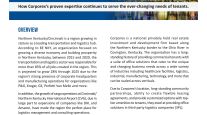3PLs Must Utilize IT More Effectively to Manage Transportation, Study Says
This story appears in the March 10 print edition of Transport Topics.
Shippers that continue to rely on third-party logistics operators, or 3PLs, to manage transportation services are pressing the providers to use information technology more effectively, a new study found.
“We have detected increases in terms of the extent to which shippers want assistance for IT [information technology] focused activities,” said John Langley, professor of supply chain management at Pennsylvania State University.
Langley created the Third Party Logistics Study, and the 18th annual report was discussed in a webinar hosted by Stifel Nicolaus.
“There is still a gap between shippers who believe IT capacity is necessary and whether they are satisfied,” Langley said.
Last year, 55% of shippers surveyed for the report were satisfied with 3PLs’ information technology services, creating a gap of 43 percentage points from the 98% who use those services.
Three years ago, that gap between use and satisfaction with IT services was 40 percentage points, and five years ago it was 55 percentage points.
“3PLs will need to take lessons from other industries,” Langley said, particularly food and other consumer products companies, in terms of managing and gleaning insights from data.
The study also found that 81% of shippers surveyed used 3PLs to manage domestic trade, and 78% used 3PLs for global trade.
Third-party operators delivered 11% lower logistics costs, the survey found. The latest study also found that 3PLs provide shippers with a 6% reduction in inventory cost and 23% lower costs to manage fixed assets, such as warehouses.
The 1,393 survey respondents were about equally split between shippers and 3PLs.
“The relationship between 3PLs and shippers continues to evolve,” Stifel Nicolaus analyst John Larkin said during the
Feb. 28 event. “Technology, breadth and depth of service offering, ability to provide continuously improved solutions, etc., are all driving the outsourcing of transportation and logistics functions to third parties.”
Langley outlined several trends and challenges, asking whether retailers will recognize the value of 3PLs as goods are increasingly sold on the Internet.
He also noted the need for evaluating strategies for shipments to and from Mexico, which move predominantly by truck.
Langley pointed out, too, the potential for greater trade and logistics activity in Africa if and when shippers believe the rewards of sourcing on that continent outweigh the risks.
Shanton Wilcox, vice president at Capgemini Consulting, said production and sourcing decisions are becoming increasingly complex, with management of risk to the supply chain as the first priority in decision making.
Another important issue, he said, was sorting through the complexity of information in international trade documents to ensure compliance.
As global trade has more than doubled in a decade, the survey identified the need to better manage the flow of goods. The greatest challenge in managing global trade is improved visibility of orders and shipments, the survey found.
Zack Deming, a principal at Korn Ferry International responsible for executing global search assignments in contract logistics, freight forwarding and transportation services, also spoke during the webinar. He said 3PLs increasingly need what he termed “smart growth leaders,” who must improve profits when demand is weak and markets are uncertain.
“It is becoming more difficult for organizations to find executive leaders,” he said. “We are seeing an emergence of a new set of skills. “The ‘smart growth leader’ will need to use resources more efficiently, collaborate more effectively with colleagues and have greater insight into customer needs, Deming said.
He envisions 10 more years of uncertainty for 3PL executives, whose management tasks were “easy” prior to the recession because of more predictable growth at that time.




